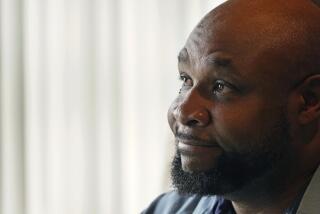Georgia Whites Resist Blacks’ Effort to Set Up City Services
- Share via
KEYSVILLE, Ga. — Fifty-four years ago, with little, if any, opposition, the town fathers of this east Georgia community of 300 residents decided to shut down the machinery of government. They dissolved all public offices, ceased holding elections, eliminated municipal services and stopped collecting taxes. Nevertheless, Keysville remained an incorporated community.
Now, a band of black community activists here, fed up with this state of affairs, is trying to reconstitute the local government to establish such civic improvements as a central water supply, a municipal sewer system, garbage collection, street lighting and police and fire protection.
In a still-classic pattern in the rural South, however, the efforts by blacks are meeting fierce resistance from whites.
City Limits Unknown
White residents contend that Keysville’s tax base is too small to support municipal services, particularly services of the magnitude envisioned by blacks. In their efforts to block the restoration of city government, they have been aided by a judicial ruling that nobody knows exactly who can vote here because nobody knows any longer exactly what the city’s boundaries are.
Blacks make up an estimated 70% of Keysville’s population and suffer the most from the lack of public services. Along some streets in black neighborhoods here, as many as four to five families are forced to share water from a single well. Old-fashioned outhouses are still in use behind some homes. Garbage bursts from overstuffed public dumpsters maintained by the county, littering yards and roads.
“We’re tired of having to live like this,” said Turetha Neeley, a spokeswoman for Keysville Concerned Citizens, the name given to the activist group leading the campaign to reactivate the local government. “We’ve got kids coming up, and we want a better life for them.”
Ability to Pay Doubted
“The black people in this town can’t even keep bread in their homes, much less keep up any obligations to the city,” said Geneva Marshall, owner of the Keysville Convalescent and Nursing Home Center, the town’s only other business besides a small general store. “I’ve loved the colored people and supported them all my life. But that’s been my only cry to them. I said: ‘Now, you want this--are you able to afford this?’ ”
She adds that many whites in this impoverished rural town about 26 miles southwest of Augusta would also find it hard to shoulder any new tax burdens.
The controversy in Keysville is not just a local brawl. It already has reached into the Georgia Statehouse in Atlanta and threatens to move into the federal courts.
Civil rights activists contend that, although Keysville may be unique in having no local government while still retaining its incorporated status, the problems here are typical of those in hundreds of other rural communities below the Mason-Dixon line where blacks form a majority of the population but remain politically disenfranchised and economically disadvantaged.
‘Institutional Barriers’
“It’s like the civil rights movement never happened in these places,” said Gayle Korotkin, an attorney at the Christic Institute-South, a public interest law firm based in Carrboro, N.C., that is providing legal assistance to Keysville blacks. “The ‘Whites Only’ signs are gone, yet institutional barriers to real political, economic and social power on the part of blacks are still there.”
Not all Keysville blacks agree with the campaign to restore the town government. A few are as skeptical as whites about claims by Keysville Concerned Citizens that federal and state community development funds would be available to finance a large share of the improvements and that any new taxes would be minimal.
“If it’s a big tax coming in here, I can’t afford it,” said Joe Oscar (Buck) Wiggins, 75, a retired railroad worker. “I can’t hardly live on the little bit I got coming in on my pension as it is.”
Fears Called Unfounded
But supporters of the movement to reconstitute the local government say such fears are unfounded. Zelline Jackson, 42, the mother of two teen-age children, says she would welcome changes in Keysville.
“Sometimes I have to catch somebody going to the next town in order to buy water at a store,” she said. “I’ve got a rain barrel in my yard to collect water for a bath. The first thing I’d do if we ever got running water up here is to take a good bath.”
Keysville blacks first acted to set up a city government two years ago, after a mobile home in a black neighborhood caught fire and burned because no help was available.
“We called the fire departments in three different counties trying to get help, but they all said that Keysville was outside their jurisdiction,” said Margie Grant, whose son, Donnie Streetman, lived in the mobile home with his wife and three small children.
“Thank God, my son was away at work and his wife and the children were able to get out safely. But that’s when we realized that Keysville ought to have fire protection and some of the other public services that people elsewhere take for granted,” Grant said.
Elections Called For
A group of black Keysville residents met with Herman Lodge, one of three blacks on the five-member Burke County Commission, to air their grievances. To their surprise, they learned that Keysville had not relinquished its incorporated status in 1933 when the town government was dismantled, and that the town charter called for local elections each year on Jan. 6.
So they called a town meeting, elected a local black and a local white to serve as superintendent of elections and published an election notice for Jan. 6 of last year.
“White residents were urged to participate and qualify for a place in the local government,” said Neeley, the spokeswoman for Keysville Concerned Citizens. “But they refused. They acted like they didn’t even know what was going on, even though we placed notices in the newspaper and distributed them door-to-door at the churches here.”
Under Georgia law, municipalities do not have to go through the expense of an election if candidates run unopposed. As a result, the blacks who filed as candidates for the mayoralty and the five council positions were sworn into office on Dec. 30, 1985, without waiting for an election.
But only five hours after the swearing-in, they were stopped from serving when six of the town’s leading white citizens got a restraining order from a state Superior Court judge in Augusta.
The judge agreed with the white plaintiffs that it was impossible to know who was eligible to vote or even to run for office since the town’s boundaries are obscure. In 1890, when Keysville was incorporated, it extended for half a mile in all directions from a schoolhouse, but the school was torn down at the turn of the century, so nobody now knows exactly where the town stops or starts.
Plea to State Official
After the new town officials were barred from serving by Superior Court Judge Albert Pickett, blacks turned to their state representative, Emory Bargeron of Louisville, for help. They asked him to introduce legislation that would solve the boundary dispute.
But Bargeron, who is white, declined to get involved in the squabble, even though the Burke County Commission had passed a unanimous resolution endorsing the black appeal. “I have friends on both sides,” Bargeron said. “I’d have to take sides and I don’t intend to take sides.”
Keysville Concerned Citizens then asked Georgia Gov. Joe Frank Harris to appoint a temporary slate of officials, asserting that the state constitution gives him the authority to fill vacancies in local offices, but the governor declined. He noted that a bill pending in the Legislature would authorize county election superintendents to call for an election in such cases and said he would take action on the proposal as soon as lawmakers approved it.
Protest at State Capitol
Keysville blacks, however, thought that the governor was trying to dodge the issue. On March 6, about 35 black Keysville residents staged a protest on the steps of the gold-domed Capitol in Atlanta, carrying signs with such slogans as: “Keysville, Ga.: City Without Hope.”
Among the demonstrators was Emma Gresham, a retired schoolteacher who was sworn in as Keysville’s mayor in 1985. “I’m 62 years old and I’ve never voted for anything in the town where I live,” she said.
Korotkin, the Christic Institute-South attorney, said the next step in the Keysville struggle, if the governor does not change his mind, is to file a lawsuit in federal District Court.
“There is a federal constitutional right, under the due process clause of the 14th Amendment, to have state officials take every step within their power to facilitate the process of holding elections where there is a right to have elections,” she said.
More to Read
Sign up for Essential California
The most important California stories and recommendations in your inbox every morning.
You may occasionally receive promotional content from the Los Angeles Times.













